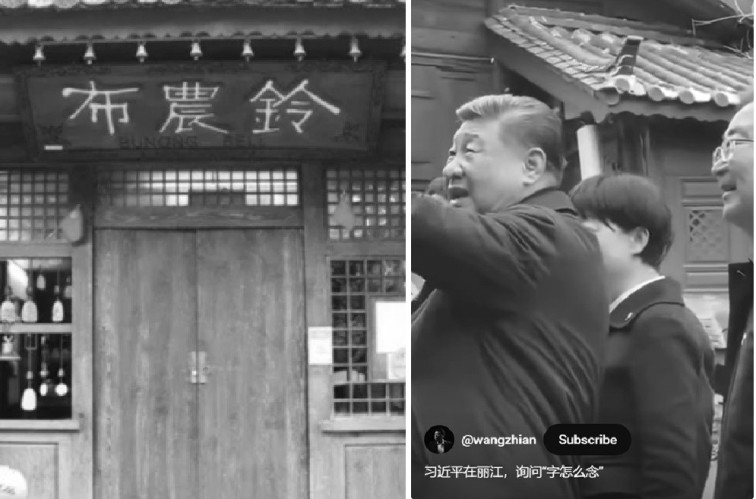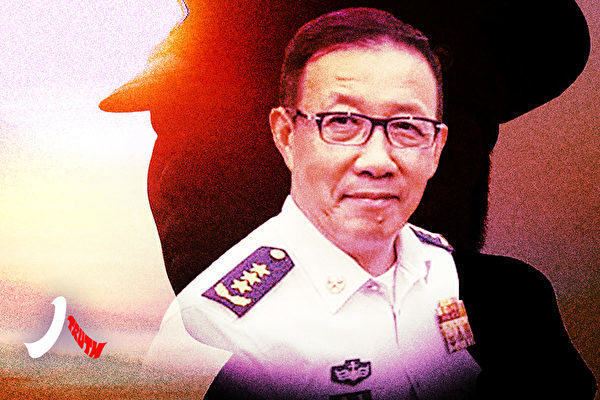On March 4, 2025, He Weidong attended the Chinese People's Political Consultative Conference. (Photo credit: Pedro Pardo/AFP via Getty Images)
[People News] Following reports of the death of He Hongjun, Executive Deputy Director of the Political Work Department of the Central Military Commission (CMC), another bombshell has emerged: CMC Vice Chairman He Weidong is also reported to have died.
On May 24, well-known independent media figure Cai Shenkun revealed that He Weidong, Vice Chairman of the CMC, had passed away. After the conclusion of the Two Sessions, He was arrested and initially held under investigation at the 301 Military Hospital. He was later transferred to Baoding, Hebei. By mid-May, the guards and kitchen staff assigned to He Weidong had already returned to Beijing. The latest information claims that He Weidong died on May 2 at the 301 Hospital—his death even predating that of He Hongjun.
This shocking development suggests that the anti-Xi and anti-CCP campaign has entered a bloody phase beginning in May. Two of Xi Jinping’s top military allies dying at the same hospital sends a chilling message: to Xi’s loyalists, it's a powerful deterrent; to Xi himself, it’s a psychological shockwave. No wonder Xi had to make a symbolic visit to the White Horse Temple and Longmen Grottoes—turning to Buddhism in desperation. At this point, faced with the choice between preserving the Party and saving himself, Xi may only have the option of trying to survive.
On March 13, shortly after the Two Sessions, journalist Zhao Lanjian first reported that He Weidong had been detained. On March 19, Zhao again reported that He was being held at the 301 Hospital, which he described as a secretive tool used by top CCP leaders to purge rivals. The revelation caused a huge stir, with rumours of Xi Jinping’s fall from power spreading like wildfire.
Subsequently, The Washington Post, citing anonymous U.S. defence officials, reported that He Weidong’s absence was believed by intelligence agencies to be related to a political purge within the Chinese military leadership. On March 27, Chinese Defence Ministry spokesman Wu Qian responded to inquiries during a routine press conference with a curt “not aware of this” and “no such information,” widely interpreted as a tacit admission. Then on March 31, Professor Yuan Hongbing revealed that Miao Hua, during his investigation, implicated over 1,300 people—He Weidong among them. On April 11, The Financial Times reported that He had been dismissed from his post.
Additionally, He Weidong’s repeated absences from major meetings and events after the Two Sessions were widely noted, including the March 14 symposium marking the 20th anniversary of the Anti-Secession Law, a late-March Politburo meeting, The April 2 capital voluntary tree-planting event, the April 8–9 CCP peripheral diplomacy work conference in Beijing, and the April 20 Politburo’s 20th group study session. As a Politburo member and CMC Vice Chairman, He Weidong should have attended all these events, yet he was conspicuously absent.
On April 30, the Standing Committee of the National People’s Congress announced that Miao Hua had been stripped of his delegate status, signalling that his case had escalated from an internal investigation to being officially designated as an enemy of the Party and the people. Meanwhile, He Weidong’s continued disappearance suggested a dire outcome was near.
On May 9, observers noted that nearly all online reports of He Weidong’s official activities had been scrubbed from the Chinese Ministry of Defence website. This move mirrored the censorship pattern seen after Miao Hua was officially declared under investigation in late November 2024. Currently, the only content remaining on the Ministry’s site related to Miao is the notice of his dismissal.
If He Weidong indeed died on May 2 and the military website began scrubbing his records by May 9, the timeline aligns. No official statement has been released regarding He’s downfall. How it will be handled may depend on the anti-Xi faction led by Hu Jintao and Zhang Youxia. The most “graceful” option may be to copy the "Qin Gang model"—a forced resignation followed by total disappearance.
Since the July 2024 Third Plenary Session, where Xi Jinping was rumoured to have lost power due to a stroke, fractures in military authority have grown more pronounced. In mid-December 2024, Zhang Youxia took control of the PLA Daily, unleashing a flurry of anti-Xi articles emphasising “democratic centralism,” “collective leadership,” and “intra-Party democracy,” while deliberately omitting references to the “Chairman responsibility system” in the military.
On January 6, 2025, Xi tried to mount a counterattack at the CCP’s Central Commission for Discipline Inspection plenary by ramping up anti-corruption efforts. On January 10, at the CMC’s discipline commission meeting, He Weidong echoed Xi’s stance by reiterating the Chairman's responsibility system, openly challenging Zhang Youxia.
According to Xinhua reports from January 26, Zhang Youxia visited the 82nd Group Army responsible for Beijing’s defence on January 22. He emphasised “following the Party’s command” but, notably, made no mention of the “Two Upholds” or the “Chairman's responsibility system.”
Meanwhile, He Weidong visited Air Force radar and search-and-rescue units near the capital, parroting all the Xiist slogans: “Two Upholds,” “Two Establishes,” and the Chairman's responsibility system.
These opposing narratives underscored a clear rift within the CMC and a sharp power struggle between Zhang and He. The conflict between them had become irreconcilable. Eliminating He Weidong thus became a critical step in Zhang’s strategy to topple Xi—a matter of when, not if.
The political storm is gathering. Reports now claim that Zhang Youxia has a “mysterious 60-day plan” involving systematic arrests and purges aimed at completely dismantling Xi’s loyalist faction. On May 14, at an expanded Politburo meeting, Zhang gave a nearly 30-minute speech, and Hu Jintao reportedly made a fierce declaration: “Even if it takes civil war, we must rescue reform and opening.”
On May 25, a transcript of Hu Jintao’s speech at that meeting was leaked online. The entire text avoided mentioning Xi Jinping by name, yet every sentence was a clear denunciation of his tyranny, personal cult, destruction of reforms, and sabotage of opening up. Hu’s words were a decisive moment, confirming that the upcoming Fourth Plenary Session will usher in a new political realignment. The Tuanpai (Communist Youth League faction) is set to return in force, and reform and openness will make a comeback.
It’s not just overseas voices predicting Xi’s fall and a radical political shift in China. Even domestic rumours now claim Xi will be out within five years. Coupled with the recent online dissent by female professors at South China University of Technology and Peking University’s Guanghua School of Management, public resistance against Xi and the Party is becoming a national consensus. The tide is turning.
In the post-Xi era, no matter who takes over, the CCP is expected to rapidly disintegrate. Under Xi, the Party has become synonymous with disaster: rivers flowing backwards, widespread suffering, and national chaos. The Xi faction will end in catastrophe, universally condemned. For future leaders, this moment serves as a profound warning: Heaven will destroy the CCP, and those who stand in the way will fall first.
By all appearances, the countdown to Xi Jinping’s downfall—and the end of the CCP—is now in its final seconds. One can only tremble before the will of Heaven.
(Originally published by People News)










News magazine bootstrap themes!
I like this themes, fast loading and look profesional
Thank you Carlos!
You're welcome!
Please support me with give positive rating!
Yes Sure!